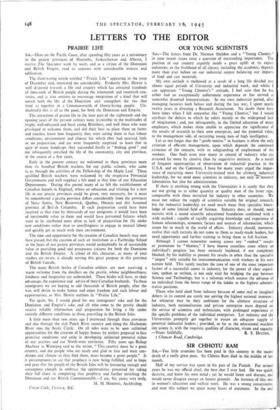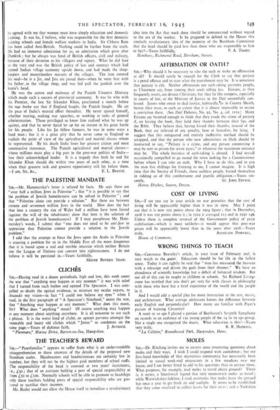SIR CHHOTU RAM
Sue,—Too little attention has been paid in this country to the recent death of a really great plan. Sir Chhotu Ram died in the middle of last month.
Half of my service was spent in his part of the Punjab. For several years he was my official chief, the best that I ever had. He was quick, decisive, and knew his own mind ; yet he would listen and discuss, and would never disagree except on honest grounds. An instance of this was in women's education and welfare work. He was a strong conservative, and over this subject we spent many hours of argument. In the end he agreed with me that women must have simple education and domestic training. It was he, I believe, who' was responsible for the first domestic training schools and female welfare workers in India. Sir Chhotu Ram has been called Anti-British. Nothing could be further from the truth. He had an immense admiration for us, an admiration which grew after Dunkirk ; but he always was fond of British officers, civil and military, because of their devotion to his villagers and sepoys. What he did hate to the very end was the British policy of law and contract which had turned Indian village economy upside down, and had made the shop- keepers and moneylenders masters of the villages. The iron entered his soul—he is a Jat, and Jats are proud Men—when he went first with his father ,to the village shop, and was bid pull the punkah over the bania's head.
He was the centre and mainstay of the Punjab Unionist Ministry which made such a success of provincial autonomy. It was he who with his Premier, the late Sir Sikandar Khan, proclaimed a month before the war broke out that if England fought, the Punjab fought. He set the pace of India's martial effort thereafter. He never spared himself, whether touring, making war speeches, or working at tasks of general administration. Those privileged to know him realised what he was up against, and that he never dared let up for an instant in his great battle for his people. Like his Jat fellow farmers, he was in some ways a hard man ; but it is a great pity that he never came to England to explain the point of view of the agricultural and martial classes whom he represented. By his death India loses her greatest citizen and most constructive statesman. The Punjab agricultural and martial classes— whose millions must play a big part in the post-war politics of India— lose their acknowledged leader. It is a tragedy that both he and Sir Sikandar Khan should die within two years of each other, at a time when their greatest task and greatest opportunity still lay before them.



























 Previous page
Previous page